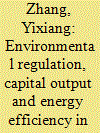|
|
|
Sort Order |
|
|
|
Items / Page
|
|
|
|
|
|
|
| Srl | Item |
| 1 |
ID:
125821


|
|
|
|
|
| Publication |
2013.
|
| Summary/Abstract |
China is one of the major energy-consuming countries, and is under great pressure to promote energy saving and reduce domestic energy consumption. Employees constitute an important target group for energy saving. However, only a few research efforts have been paid to study what drives employee energy saving behavior in organizations. To fill this gap, drawing on norm activation model (NAM), we built a research model to study antecedents of employee electricity saving behavior in organizations. The model was empirically tested using survey data collected from office workers in Beijing, China. Results show that personal norm positively influences employee electricity saving behavior. Organizational electricity saving climate negatively moderates the effect of personal norm on electricity saving behavior. Awareness of consequences, ascription of responsibility, and organizational electricity saving climate positively influence personal norm. Furthermore, awareness of consequences positively influences ascription of responsibility. This paper contributes to the energy saving behavior literature by building a theoretical model of employee electricity saving behavior which is understudied in the current literature. Based on the empirical results, implications on how to promote employee electricity saving are discussed.
|
|
|
|
|
|
|
|
|
|
|
|
|
|
|
|
| 2 |
ID:
105773


|
|
|
|
|
| Publication |
2011.
|
| Summary/Abstract |
This research sets out to explore the possibilities for further saving in household electricity consumption through a study of the residents' willingness and behavioural characteristics in electricity saving, as applied within a Chinese context. Based on an extensive literature review, the authors argue that economic benefits, policy and social norms, and past experience may have a positive correlation with household electricity-saving behaviour, while the discomfort caused by electricity-saving activities, may exert a negative effect on it. Through a sample of 816 randomly selected residents in Beijing, the propositions are examined using logit regression analysis. The conclusions support the ideas, concerning both the positive influence of economic benefits, policy and social norms, and past experience as they affect broader electricity-saving behaviour, and the negative influence of the discomfort caused by electricity-saving activities. Finally, some inferences are drawn, and suggestions are offered for policy makers and further studies.
|
|
|
|
|
|
|
|
|
|
|
|
|
|
|
|
| 3 |
ID:
111420


|
|
|
|
|
| Publication |
2012.
|
| Summary/Abstract |
Energy technology innovation plays a crucial role in reducing carbon emissions. This paper investigates whether there is relationship between energy technology patents and CO2 emissions of 30 provinces in mainland China during 1997-2008. Gross domestic product (GDP) is included in the study due to its impact on CO2 emissions and energy technology innovation, thus avoiding the problem of omitted variable bias. Furthermore, we investigate three cross-regional groups, namely eastern, central and western China. The results show that domestic patents for fossil-fueled technologies have no significant effect on CO2 emissions reduction; however, domestic patents for carbon-free energy technologies appear to play an important role in reducing CO2 emissions, which is significant in eastern China, but is not significant in central, western and national level of China. The results of this study enrich energy technology innovation theories and provide some implications for energy technology policy making.
|
|
|
|
|
|
|
|
|
|
|
|
|
|
|
|
| 4 |
ID:
175239


|
|
|
|
|
| Summary/Abstract |
How to improve environmental quality and achieve high-quality development of economy have become important challenges for China in the new era. Based on the KLEMS framework, this paper analyzes the relationship between environmental regulation, factor substitution, and energy-saving effect by using panel structure vector autoregression model and panel data of China industry from 2004 to 2014. The following conclusions are drawn:(1) China's environmental regulation can promote the substitution of capital to energy, however, benefit of this substitution in the long run is greater than that in the short run. (2) Only in the long run can China's environmental regulations have significant energy-saving effect, technological innovation is the main reason for the improvement of energy-saving effect of environmental regulation. (3) China's environmental regulation will not significantly improve the structure of capital, which makes the economic benefits low. Finally, the paper discusses the possible ways to improve China's environmental regulation from the aspects of forming a scientific environmental supervision system, improving energy pricing mechanism and capital structure.
|
|
|
|
|
|
|
|
|
|
|
|
|
|
|
|
| 5 |
ID:
177115


|
|
|
|
|
| Summary/Abstract |
Household appliances consume a considerable amount of energy. Consumers' choice of household appliances with different energy efficiency levels affects their future energy consumption. Therefore, guiding consumers to choose energy-efficient appliances is important. Consumers purchase household appliances to enjoy the utility of the products' attributes. Which attributes are important when choosing household appliances? Will energy efficiency level affect appliance price that consumers pay for? To answer these questions, a hedonic price model is used to quantify the utility value of appliance attributes and explore key appliance attributes through three dimensions, namely, policy, platform, and product attributes. Consumers' preferences for different appliance attributes can be revealed by empirically analyzing the relationship between these attributes and appliance price. Refrigerator data were crawled from a large e-commerce website in China, and data of 1612 products were obtained after data cleaning. Results show that attributes, such as energy efficiency label and brand, have an important impact on refrigerator price. The results have important implications for the further development of China's appliance enterprises and energy efficiency label.
|
|
|
|
|
|
|
|
|
|
|
|
|
|
|
|
|
|
|
|
|